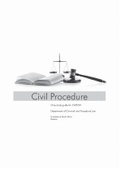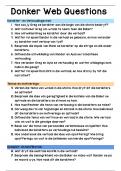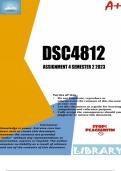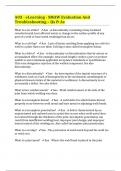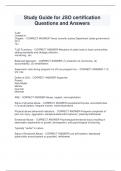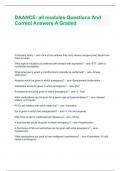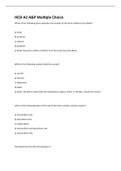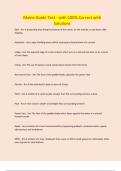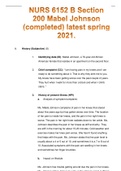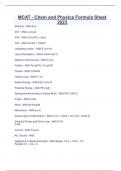LML4806
PORTFOLIO MEMO
OCT 2022
,QUESTION 1
1.1 Discuss the relevant section of the Companies Act 71 of 2008 that appears
to be a codification of the common-law Turquand rule and highlight the
similarities and the differences between the provisions of that particular
section and the common-law Turquand rule. (10)
The Turquand rule emanates from the seminal English of Royal British Bank v
Turquand1. According to the common law Turquand rule, an outsider doing business
with the company in good faith is entitled to assume that all internal requirements and
procedures, which the contracting party should have followed, have been complied
with. As a result the company will be bound by the contract even if the internal
requirements and procedures have not been complied with. It would be a different
case if:
a) if the outsider was aware of the fact that the requirements and procedures had
not been complied with; or
b) if the circumstances in which the contract was concluded were suspicious.
The Turquand rule was formulated to keep an outsider’s duty to inquire into the affairs
of the company within reasonable bounds.2 In the case of Wolpert3, it was provided
in the Articles of the company that the board of directors are empowered to allow a
person to sign promissory notes on its behalf. Clearly, the board could authorise
anyone to sign promissory notes on its behalf. In the Wolpert case, one of the
company’s ordinary directors signed promissory notes on behalf of the company
without authorisation and the question arose whether the outsider was entitled to
assume that the director was authorised to do so.4
1 Royal British Bank v Turquand (1856) 6 El. & Bl. 327; 119 ER 886
2 Cassim FHI , Cassim MF, Cassim R, Jooste R, Shev J and Yeats J The Law of Business Structures
Juta ( Cape Town 2012) p 200.
3 Wolpert v Uitzigt Properties (Pty) Ltd 1961 (2) SA 257 (W.,
4 Cassim FHI , Cassim MF, Cassim R, Jooste R, Shev J and Yeats J The Law of Business Structures
Juta ( Cape Town 2012) p 200.
, The court found that an outsider with express or constructive notice of the Articles
could assume that someone was authorised to sign the notes, but not that a specific
person was authorised to do so. The Turquand rule only comes into operation if an
internal formality is required.5 For the Turquand rule to come into operation, the person
who acted must have possessed actual authority, which was subject to an internal
formality. In Tuckers Land and Development Corporation (Pty) Ltd6, the court found
that third parties may not automatically assume that a branch manager or an ordinary
director has authority to act on behalf of the company. The company may still escape
liability on the ground that the person had no authority.7
The Companies Act has in a sense codified the Turquand rule in s20(7) which provides
as follows (emphasis added) that a person dealing with a company in good faith, is
entitled to assume that the company has complied with all the procedural requirements
in terms of this Act, its MOI and any rules of the company, unless the person knew or
reasonably ought to have known of any failure by the company to comply with its
formal and procedural requirements. This section also modifies the Turquand rule by
preventing a third party from invoking the rule where he or she ought reasonably to
have known of non-compliance by the company. It differs from the common law
Turquand rule, which requires that the third party must not have had any suspicion of
non-compliance by the company.
In spite of the apparent similarity between the Turquand rule and the provisions of
section 20(7)8, the Turquand rule has not been abolished by the statutory provision,
because section 20(8) specifically states that section 20(7) “must be construed
concurrently with, and not in substitution for, any relevant common law principle
relating to the presumed validity of the actions of a company …”
The Turquand rule is applied by the South African courts when deciding whether a
company should be bound to a contract concluded with a third party in the circumstances,
where the company’s representative concluding the contract on behalf of the company
is unauthorised to do so due to an irregularity in the company’s internal procedures, or
5 Cassim FHI , Cassim MF, Cassim R, Jooste R, Shev J and Yeats J The Law of Business Structures
Juta ( Cape Town 2012) p 200.
6 Tuckers Land and Development Corporation (Pty) Ltd v Perpellief 1978 (2) SA 11 (T).
7 Cassim FHI , Cassim MF, Cassim R, Jooste R, Shev J and Yeats J The Law of Business Structures
Juta ( Cape Town 2012) p 200.
8 Companies Act 71 of 2008.
PORTFOLIO MEMO
OCT 2022
,QUESTION 1
1.1 Discuss the relevant section of the Companies Act 71 of 2008 that appears
to be a codification of the common-law Turquand rule and highlight the
similarities and the differences between the provisions of that particular
section and the common-law Turquand rule. (10)
The Turquand rule emanates from the seminal English of Royal British Bank v
Turquand1. According to the common law Turquand rule, an outsider doing business
with the company in good faith is entitled to assume that all internal requirements and
procedures, which the contracting party should have followed, have been complied
with. As a result the company will be bound by the contract even if the internal
requirements and procedures have not been complied with. It would be a different
case if:
a) if the outsider was aware of the fact that the requirements and procedures had
not been complied with; or
b) if the circumstances in which the contract was concluded were suspicious.
The Turquand rule was formulated to keep an outsider’s duty to inquire into the affairs
of the company within reasonable bounds.2 In the case of Wolpert3, it was provided
in the Articles of the company that the board of directors are empowered to allow a
person to sign promissory notes on its behalf. Clearly, the board could authorise
anyone to sign promissory notes on its behalf. In the Wolpert case, one of the
company’s ordinary directors signed promissory notes on behalf of the company
without authorisation and the question arose whether the outsider was entitled to
assume that the director was authorised to do so.4
1 Royal British Bank v Turquand (1856) 6 El. & Bl. 327; 119 ER 886
2 Cassim FHI , Cassim MF, Cassim R, Jooste R, Shev J and Yeats J The Law of Business Structures
Juta ( Cape Town 2012) p 200.
3 Wolpert v Uitzigt Properties (Pty) Ltd 1961 (2) SA 257 (W.,
4 Cassim FHI , Cassim MF, Cassim R, Jooste R, Shev J and Yeats J The Law of Business Structures
Juta ( Cape Town 2012) p 200.
, The court found that an outsider with express or constructive notice of the Articles
could assume that someone was authorised to sign the notes, but not that a specific
person was authorised to do so. The Turquand rule only comes into operation if an
internal formality is required.5 For the Turquand rule to come into operation, the person
who acted must have possessed actual authority, which was subject to an internal
formality. In Tuckers Land and Development Corporation (Pty) Ltd6, the court found
that third parties may not automatically assume that a branch manager or an ordinary
director has authority to act on behalf of the company. The company may still escape
liability on the ground that the person had no authority.7
The Companies Act has in a sense codified the Turquand rule in s20(7) which provides
as follows (emphasis added) that a person dealing with a company in good faith, is
entitled to assume that the company has complied with all the procedural requirements
in terms of this Act, its MOI and any rules of the company, unless the person knew or
reasonably ought to have known of any failure by the company to comply with its
formal and procedural requirements. This section also modifies the Turquand rule by
preventing a third party from invoking the rule where he or she ought reasonably to
have known of non-compliance by the company. It differs from the common law
Turquand rule, which requires that the third party must not have had any suspicion of
non-compliance by the company.
In spite of the apparent similarity between the Turquand rule and the provisions of
section 20(7)8, the Turquand rule has not been abolished by the statutory provision,
because section 20(8) specifically states that section 20(7) “must be construed
concurrently with, and not in substitution for, any relevant common law principle
relating to the presumed validity of the actions of a company …”
The Turquand rule is applied by the South African courts when deciding whether a
company should be bound to a contract concluded with a third party in the circumstances,
where the company’s representative concluding the contract on behalf of the company
is unauthorised to do so due to an irregularity in the company’s internal procedures, or
5 Cassim FHI , Cassim MF, Cassim R, Jooste R, Shev J and Yeats J The Law of Business Structures
Juta ( Cape Town 2012) p 200.
6 Tuckers Land and Development Corporation (Pty) Ltd v Perpellief 1978 (2) SA 11 (T).
7 Cassim FHI , Cassim MF, Cassim R, Jooste R, Shev J and Yeats J The Law of Business Structures
Juta ( Cape Town 2012) p 200.
8 Companies Act 71 of 2008.



